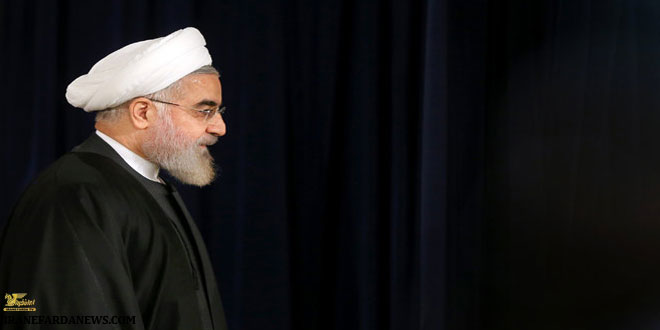THE NEW YORK TIMES-
By RICK GLADSTONEDEC-
Iran’s president denounced the United States on Thursday for suggesting the possibility of new sanctions over Iranian missiles, and he ordered his Defense Ministry to respond by swiftly building more of them.
Hours after circulating a draft of proposed sanctions on Wednesday, however, the White House did not provide a timetable or even say that they would be put into effect.
Still, the action by the president, Hassan Rouhani, came against a backdrop of increased friction between the United States and Iran. That friction appears to have discouraged any hopes of reconciliation in the near future despite the international agreement reached over the summer to restrict Iran’s nuclear activities, which required close collaboration by diplomats from the two countries.
The official Islamic Republic News Agency said Mr. Rouhani, responding to the American government’s “illegal intervention in Tehran’s right to boost its defensive power,” had instructed the defense minister, Brig. Gen. Hossein Dehghan, to “quickly and firmly continue with its plans to produce different missiles needed by the country’s armed forces.”
The news agency also quoted a Foreign Ministry spokesman, Hossein Jaber Ansari, as warning the United States against what he called actions that are “unilateral, arbitrary and illegal.”
Speaking later on state television’s nightly news program, General Dehghan said he intended to make Iran’s missiles more powerful. “Given the current circumstances in the region and the world, we believe peace and security can only be achieved through strength,” he said. “Therefore, we are going to expand our missiles in terms of range and accuracy.”
The response was notable in part because it appeared to reflect internal political pressure on Mr. Rouhani to show some defiance in the face of what are seen among Iran’s hard-line conservatives as American threats.
Mr. Rouhani, who had pushed for the nuclear agreement, has been widely perceived as wanting improved relations with the United States, a position that has angered some domestic rivals. Mr. Rouhani has been less confrontational compared with the supreme leader, Ayatollah Ali Khamenei, who endorsed the nuclear accord but warned that the United States could never be trusted and that new sanctions would be regarded as a violation.
Whether the missile dispute will have an adverse effect on the nuclear agreement remains unclear. Under the agreement, many economic sanctions on Iran will be relaxed — possibly within weeks — in exchange for Iran’s verifiable guarantees of peaceful nuclear work. A major step was taken by Iran a few days ago when it handed over a stockpile of enriched uranium to Russia.
Mr. Rouhani’s action on Thursday came a day after Obama administration officials sent to Congress the draft of potential new sanctions against Iran over recent missile tests, which appeared to have violated a United Nations Security Council prohibition. Although no sanctions seemed imminent, the White House said Thursday that they remained an option.
The United States has also accused Iran’s Revolutionary Guards of recklessly and provocatively firing rockets this week in the vicinity of American warships in the heavily trafficked Strait of Hormuz, a vital international waterway bordering southern Iran that connects with the Persian Gulf.
A spokesman for the Revolutionary Guards, Ramezan Sharif, was quoted by Iranian news media on Thursday as denying the accusations, describing them as fabrications and a “psychological operation” to inflame tensions.
A new American antiterrorism measure President Obama signed into law on Dec. 18 restricts visa-free travel for anyone who has visited Iran, Iraq, Syria or Sudan within the past five years. Iran has strongly objected to the measure.
Analysts who have been following the twists of the nuclear deal said the recent flare-up would not necessarily disrupt it. But some expressed concern that other issues that would benefit from collaboration between the two countries — fighting the Islamic State extremist group, for example — could now become more troublesome to resolve.
“Iranian and U.S. leaders are taking hard-line positions across the board right now — to keep conservative constituencies on board with the nuclear deal,” said Cliff Kupchan, the chairman of the Eurasia Group, a political risk consultancy in Washington.
“It’s a very bad turn,” Mr. Kupchan said. “U.S.-Iran cooperation on ISIS, Afghanistan and other issues is sorely needed and in both nations’ interest. But domestic politics in Washington and Tehran is going to lead to another missed opportunity.”
Others said Mr. Rouhani had no choice but to take a hawkish stand on Iran’s missile development to mollify his military leaders. That may be especially so now that the country’s avenues for attaining nuclear weapons— should it ever want them — have effectively been blocked or at least rendered far more difficult.
“Iran was never going to stop developing missiles,” said Alireza Nader, an Iran expert at the Washington offices of the RAND Corporation, a research group.
“The missiles are its most important defensive and offensive capability given its conventional military inferiority,” he said. “No Iranian president can demand that the military stop missile development.”
 khalijefars News, Blogs, Art and Community
khalijefars News, Blogs, Art and Community









